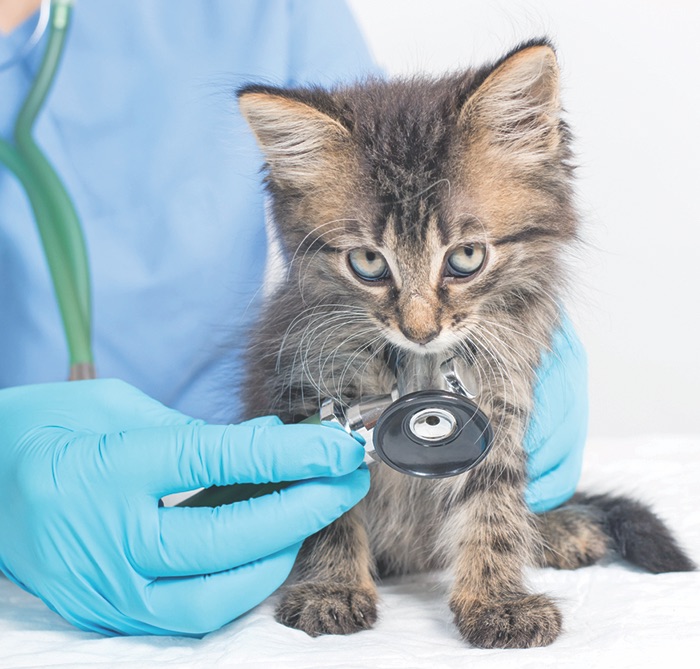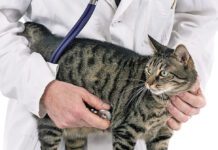Kudos to all who faithfully bring their beloved feline companions to the veterinarian every year for a wellness check. This is the best way to detect heart murmurs early. As any dedicated cat owner knows, cats are experts at hiding signs of disease, and this is certainly true of cardiac disease. Cats may experience significant progression of their disease before they show any signs.
The Wellness Angle
If your veterinarian does hear a heart murmur at your cat’s annual exam, it’s time to act. Granted, the softer or quieter the murmur, the less likely it is associated with significant cardiac disease, but the only way to know is to look further. It’s important to note that some cats with heart murmurs do not have heart disease.
A good screening test for an asymptomatic cat with a new heart murmur is called an N-terminal pro-brain natriuretic peptide (NT-proBNP) assay. NT-proBNP is a protein that is excreted into the blood by heart muscle when it is stretched, which is commonly the case with heart disease. If the test comes back normal, it’s a pretty good indicator that your cat’s heart is in good shape. If it comes back abnormally elevated, this may suggest heart disease, but don’t panic, as false positives are known to occur. Cases in which elevated NT-proBNP are documented should be followed up with further testing.
“In cats with heart murmurs, measurement of NT-proBNP should be considered to help determine the best diagnostic and treatment options for your cat,” says Cornell grad and board-certified veterinary cardiologist Eva Oxford, DVM, PhD, owner of The Heart Vet Cardiology Services for Animals (Ithaca, Syracuse, and Freeville, N.Y.). NT pro-BNP can also be used as a screening test for early detection of cardiac disease in cats that are at increased risk of heart disease but don’t have heart murmurs (i.e., certain breeds, like Maine Coon cats and Ragdolls), as murmurs can be transient in some cases.
The other primary use of NT-pro BNP in clinical feline practice is to distinguish difficulty breathing caused by heart disease (i.e., congestive heart failure) from that caused by another disease process, such as pneumonia or asthma.
Dr. Oxford says, “NT-proBNP can be falsely elevated in cats with kidney disease. Therefore, it is recommended that the assay be submitted alongside a blood chemistry profile to evaluate kidney function at the same time.”
This means that if your cat has a new heart murmur and is not showing any signs of disease, your veterinarian may suggest submitting both NT-pro-BNP and serum biochemistry tests. Alternatively, an NT-pro BNP may be submitted first, and if this is elevated, it may be followed up by a biochemistry test to rule out kidney disease as a potential cause of NT-pro BNP elevation.
“Echocardiography is the gold-standard test to evaluate cardiac structure and function in both humans and animals,” says Dr. Oxford. “Echocardiographic imaging typically provides a specific diagnosis and allows the cardiologist to develop a customized treatment plan for your pet. If your cat develops a heart murmur, an echocardiogram should absolutely be considered as the single most important test to obtain.”
Causes
Cats can be born with congenital heart defects, but these are not common. Most murmurs in cats are acquired with time. Acquired murmurs can be persistent or transient (of short duration).
Not all murmurs are bad. Some are “innocent” or benign (not associated with disease). Innocent murmurs can be due to stress and a rapid heartbeat, things frequently associated with the feline physical exam. They can also be positional, depending on how a cat is situated on an exam table, and can be affected by the pressure applied to a stethoscope. Anemic cats can have murmurs called physiologic or flow murmurs that are not associated with cardiac disease and that resolve with resolution of the anemia.
Adult cats can develop a benign heart murmur from an apparently unique feline condition called dynamic right ventricular outflow tract obstruction (DRVOTO) that is diagnosed by echocardiography. “DRVOTO is thought to be the result of an altered compliance (decreased elasticity) of the right heart, which occurs naturally as cats age, and is commonly heard at higher heart rates, such as when a cat is stressed during a veterinary exam. DRVOTO is not necessarily an indication of cardiac disease,” says Dr. Oxford.
What about murmurs associated with heart disease? “Hypertrophic cardiomyopathy (HCM) is the most common heart disease in adult cats,” says Dr. Oxford, “and is therefore the most common pathologic cause of an acquired heart murmur.”
According to Dr. Oxford, HCM can have life-altering consequences. While the prognosis is variable, depending on the stage at which it is discovered, it tends to be progressive and commonly leads to congestive heart failure. Medications, while not curative, can help cats with HCM live better, longer lives by treating congestive heart failure if it develops. They can help prevent aortic thromboembolism, a condition in which blood clots form in the heart and are ejected to the body (usually the hind limbs), resulting in blockage of blood flow and organ dysfunction (acute hind limb pain and paralysis in the case of thromboembolism to the hind limbs).
In summary, while some cats with heart murmurs do not have heart disease, most cats with heart disease do have murmurs, and murmurs should always be taken seriously and followed up with appropriate diagnostic testing as recommended by your veterinarian.




